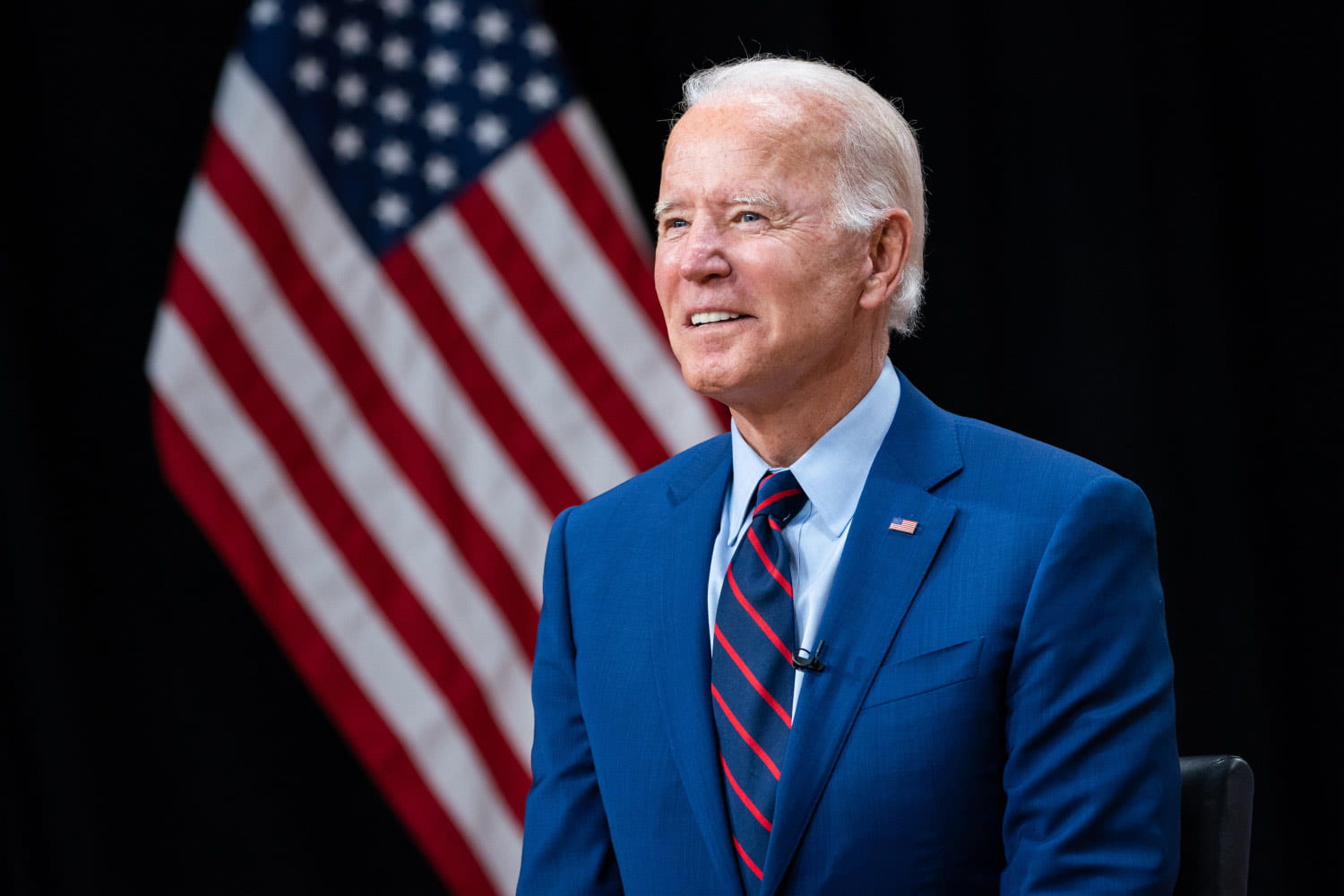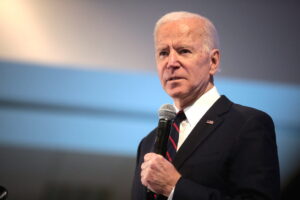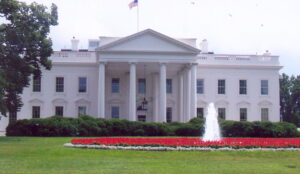Tag: president
An Open Letter to President Biden
by David Salzillo Jr. '24 on November 17, 2022
Opinion Staff
Editorials

Dear President Biden,
Congratulations. As I am writing this, your party has managed to hold the Senate, and still—as of Nov. 14—has a fighting chance of holding the House. Your instincts have proven correct: above and beyond political disagreements and the public’s view of your presidency, the majority of voters expressed their desire to prevent government by the people, of the people, and for the people from “perishing from the earth.” Yes, it was a close call, and too close for me to be content with. However, the majority did speak with a resounding voice, bringing a decisive defeat to election deniers and other anti-democratic rhetoric within the Republican Party. For now, the threat of authoritarianism in America has stayed.
I, for one, give you your proper credit. When others in the party did not, you had faith in the working people across this country making the right choice. And when Democratic pundits fell into hysterics about “red waves,” you kept calm. But now we have won. And, like Robert Redford in The Candidate, we must ask this question: “What do we do now?” The battle is not over, and the stakes are higher than ever.
We see the rise of “new and improved” Trumpian and anti-democratic politicians like Ron DeSantis. We see one of our two major political parties still consumed by election denialism and political primaries that reward these election deniers. Worst of all, we see that the Republican Party establishment is, as it stands now, far too morally bankrupt to repudiate Trumpism once and for all. Even if Republican Party leaders cast Trump aside, they will only cast him aside because he “didn’t work” like they wanted him to—like a child throwing away a dysfunctional toy.
Our politics cannot survive like this for much longer. One might say the Republican Party will implode if it continues on this path. On the other hand, it might not. It might instead take us on more of a “winding road” toward authoritarianism. We cannot take the chance.
You want to be a great president. What’s more, you need to be a great president for our republic to survive. To overcome such fundamental threats to our democracy, nothing less than a great transformation of American society is necessary. And when the problem is our politics and, more to the point, our politicians, then a top-down transformation appears even more appropriate. Consider the example of history too. Each time we have had a “crisis of confidence” in our democracy—whether during the Civil War or the Great Depression—a great President has led us closer to the Promised Land.
Like Thomas Paine once said of the American Revolution, “we have it in our power to begin the world over again.” But that requires an ambitious agenda, on par with Johnson’s Great Society and FDR’s New Deal. Of course, I can hear your advisers saying, “But we have done that. Haven’t you heard about our historic investments in infrastructure? And what about our historic initiative to get Medicare to negotiate prescription drug prices?” I respond simply: the infrastructure investments, historic as they are, are like pouring a bucket of water onto a California wildfire. Likewise, Congress passing a bill allowing Medicare to negotiate prescription drug prices, while appreciated, was long overdue.
What I am saying is go bigger. Think bigger. President Johnson could have made historic progress on civil rights without passing the Civil Rights Act of 1964 and the Voting Rights Act of 1965. Why? Because other presidents had not been able to do much of anything on that front. And President Johnson could have made historic investments in combating poverty without the Great Society. All he had to do was invest $1 more than Kennedy or Roosevelt had. But that is not what he did. History rightly celebrates Johnson for his vision. Without that type of thinking, would anybody have the chance to enjoy the benefits of Medicare and Medicaid?
Nonetheless, I realize you face certain practical limitations. By all means, acknowledge them. For my part, I will be brutally honest: this is going to be hard, and it at times will seem impossible. It will take some masterful politicking, just as it did in Johnson’s time. Even then, advancing a bold legislative agenda is no less impossible than it was to get the Civil Rights Bill through a Senate with segregationists and the filibuster.
I am confident the American people will follow a good vision, with results that positively affect their everyday lives. Voters may not be able to fact-check as well as they could, but they can read “the signs of the times.” If your Administration passes the bills, your Administration will reap the rewards.
It’s getting there that’s the problem. You have a possible Republican House, you have at least 50 Democratic Senators, and you have Senators Joe Manchin and Kyrsten Sinema. What could you possibly do with that?
It may look like you got the wrong deck of cards for a great presidency. Nevertheless, there is still some hope. But not in conventional compromising. Those days are over, for better or worse. I propose to you, as St. Paul did to the Corinthians, a “better way.” Consider again Johnson’s Civil Rights Bill. As Jonathan Rauch notes in “How American Politics Went Insane,” getting that bill passed meant getting it past House Republican leader Charles Halleck of Indiana. How? Was it through a passionate debate of the issues or principled arguments for the equality of all people? No. A NASA research grant for Halleck’s district was enough to do the job. This approach to politics might make one cynical, but not me. Instead, it shows how even political self-interest can lead to monumental change.
I will add this: per the old cliché, “nothing succeeds like success.” Republicans will not compromise on their own; the people must force them to take their places at the negotiating table. If your Administration can pass more and more ambitious legislation—even if by one vote—and people start to like what you are doing, then Republicans will have to compromise. Self-interest and self-preservation will drag them along. As Martin Luther King Jr. said, “A genuine leader is not a searcher of consensus but a molder of consensus.” President Johnson likely would have agreed. Compromise, indeed, is not exactly the right word to describe how Johnson passed the Civil Rights bills; arm-twisting is perhaps the more accurate term. Johnson used every method of persuasion he had to get his party and those in the other party onboard.
Obviously, you might not want to imitate everything Johnson did. But a little more arm-twisting may do some good, especially if Democrats gain a seat in the Senate and especially if somehow Democrats hold the House. Arm-twisting, aggressive public relations efforts, and some good old-fashioned backroom negotiations. They have never failed the traditional politician, and it may be fatal to go back to the “let’s split everything down the middle” model of compromise. Instead of splitting things down the middle (after all, what is the middle now? The halfway point between you and Marjorie Taylor Greene?), we must push the middle over.
Thomas Paine once said, “we have it in our power to begin the world over again.” And if we do not take advantage of that power, then others will. And we may not like the world they give us.
Biden Takes Limited Action Against Saudi Prince: Decision Stirs Controversy Within Biden’s Own Party
by The Cowl Editor on March 4, 2021
National and Global News

by Eileen Cooney ’23
News Staff
On Friday, Feb. 26, the Biden administration released a report implicating Saudi Prince Mohammed bin Salman in the 2018 assassination of journalist Jamal Khashoggi. Khashoggi was a 59-year-old U.S. resident and an outspoken critic of the Saudi royal family who was killed and later dismembered inside the Saudi consulate.
Democrats and former Central Intelligence Agency director John Brennan have overtly criticized President Joseph Biden for not directly punishing or speaking out against the Saudi Arabian crown prince. Biden did sanction a top aide to the prince, but he did not explicitly punish MBS, even though it is widely acknowledged that the prince ordered the killing of Khashoggi.
Since the Saudis are primary buyers of American-produced guns, arms, and other military weapons, the kingdom largely escaped retaliatory sanctions during Donald Trump’s presidency, and this pattern seems to be continuing under the Biden administration.
Many Democrats and members of the human rights community are outraged at the Biden administration’s response, especially after Biden himself called Saudi Arabia a “pariah state with no redeeming social value” during his 2020 campaign. Many of these people are pressing Biden to at least impose some travel sanctions against the crown prince.
In response, Secretary of State Antony J. Blinken, announced plans to add a “Khashoggi ban,” which would restrict visas to all who are deemed to be participating in state-sponsored actions to hurt journalists and other dissidents around the globe. This is part of the State Department’s efforts to create a novel category of human rights abuse known as “extraterritorial repression,” which has become a growing issue in countries such as Russia, China, and Turkey.
Jen Psaki, the White House press secretary, defended the Biden administration’s actions saying, “Historically and even in recent history, Democratic and Republican administrations, there have not been sanctions put in place for the leaders of foreign governments where we have diplomatic relations and even where we don’t have diplomatic relations.” She says that Biden and his foreign relations team think there are more effective ways to make sure that an atrocity like this does not happen again, and that they want to leave room to work with the Saudis and to come to an agreement that serves the interests of both sides.
This controversy comes in the wake of Biden announcing the end of U.S. support for offensive operations in Yemen earlier this month. Last month, Biden also froze sales of precision-guided munitions to Saudi Arabia, announcing that he wanted to assess the potential human rights abuses that were occurring.
On 60 Minutes back in October 2018, former President Trump said that there are other ways to impose penalties on the Saudis and that he would not want to see the U.S. take actions that “hurt jobs…or lose an order like that.”
It remains to be seen what implications this will have on Biden’s future dealings with Saudi Arabia. For now, the administration has announced that Biden will conduct relations solely through King Salman, the crown prince’s father.
Welcome, Folks, to the Biden Administration: A Closer Look at the First 100 Days in Office
by The Cowl Editor on February 11, 2021
National and Global News

Photo courtesy of pixnio.com.
by Katherine Morrissey ’22
News Staff
Joseph Biden, Jr., ran a successful campaign grounded on a platform that aligned itself with the Democratic Party’s core beliefs, ultimately resulting in his inauguration as the 46th president of the United States.
The significance of an administration’s first 100 days in office dates back to the incredible feats accomplished by President Franklin D. Roosevelt at the start of his presidency in 1933. In the wake of the Great Depression, Roosevelt inherited a country in economic tatters with nearly a quarter of the nation unemployed following the stock market crash of late 1929. However, Roosevelt did not let the circumstances delay implementing his progressive agenda to help combat the economic and social effects of the Great Depression through the passage of 15 bills.
After being sworn in on Jan. 20, President Biden inherited a United States in a period of distress, much like President Roosevelt did in 1933. However, many would argue that President Biden has perhaps inherited circumstances that are far more unprecedented.
Within the last year, according to the New York Times, over 400,000 Americans have lost their lives during the nation’s struggle to combat the COVID-19 pandemic. Additionally, the pandemic has had detrimental effects on the country’s economic performance.
According to the Bureau of Economic Analysis, the United States experienced two consecutive quarters of decline in gross domestic product, indicative of a recession. Furthermore, it recorded a decrease of 9.1 percent in the second quarter of 2020. This marked the country’s starkest quarterly drop of economic output in recorded history—quarterly GDP has been recorded since 1947 and has never exceeded a drop of more than three percent throughout various recessions.
Given that the nation is faced with such dire circumstances as a result of the ongoing pandemic, a large part of President Biden’s agenda for the beginning of his administration involves taking swift action to combat the ongoing public health and economic crises. While President Biden has made significant promises to combat COVID-19, he also plans to make good on other pledges he made during his campaign regarding other key issues. For example, he has promised to send a bill to Congress which would be for “legislative immigration reform that will modernize our immigration system and give nearly 11 million undocumented immigrants a roadmap to citizenship.”
In regard to the climate and environmental concerns of the country, President Biden promised to sign two executive orders. The first will create a plan to reach a one hundred percent clean energy economy and net-zero emissions by 2050. The next would look “to conserve 30% of America’s lands and waters by 2030.”
On the note of civil rights, President Biden promised to repeal the Trump-era military ban on transgender individuals and restore the protections and provisions of the Obama administration concerning transgender rights.
Additionally, President Biden signed executive orders that included rejoining the Paris Climate Agreement, launching a “100 day mask challenge,” extending student loan pause, launching a Whole-of-Government Initiative to Advance Racial Equity, halting construction of the southern border wall, restoring protection of DREAMers, reversing the Muslim ban, and ensuring worker protections by mandating that employees follow CDC guidelines.
While many frequently criticize Biden for his centrist or moderate beliefs amongst his Democratic constituents, these actions taken on his first day in office actually demonstrate his commitment to following through on a progressive agenda, regardless of the tumultuous times our country is enduring.
Going forward, Americans can expect the Biden Administration to continue to be aggressive in attempting to implement the policies they promised on the campaign trail, as well as in reversing Trump-era policies.
The administration is currently working with Congress to reach a compromise to provide greater economic relief to citizens through another round of stimulus checks.
Although the circumstances are different, the legacy of President Roosevelt’s first 100 days in the Oval Office seems to be shaping the Biden Administration’s approach to office as Biden optimistically attempts to steer the United States out of a historically challenging period and into one of hope and prosperity.
Bursting the PC Bubble: Takeaways from the First 2020 Presidential Debate
by The Cowl Editor on October 15, 2020
National and Global News

by Addison Wakelin ’22
News Staff
Less than a month away from the 2020 presidential election, the first presidential debate left many Americans in a state of pessimism and uncertainty about the future of the United States.
On Tuesday, Sept. 29 in Cleveland, former Vice President Joe Biden and President Donald Trump faced off in a brutish debate during one of the most unprecedented times in modern U.S. history. The debate was moderated by Fox News anchor Chris Wallace.
Although the debate became somewhat personal given Trump’s jeers and ad hominem attacks against Biden and his family—especially Hunter Biden—the two debated on some important topics pertaining to the United States. The debate can be broken down into several important topics, picked by Wallace, including the Supreme Court vacancy, the COVID-19 pandemic, protests and violence in cities as a result of the issue of racism, and the economy.
Following the tragic death of former Supreme Court Justice Ruth Bader Ginsburg, the Supreme Court vacancy has become a point of interest for Republicans. Less than two weeks after RBG’s death, Trump announced he would nominate Amy Coney Barrett to the Supreme Court.
Several Republicans, including South Carolina Senator Lindsey Graham and Kentucky Senator Mitch McConnell, have been criticized for their hypocritical comments on blocking Obama’s nomination of Merrick Garland to the Supreme Court in 2016, claiming it would be unfair to Americans to vote for a justice during an election year.
Biden countered Trump’s claims, warning that Barrett’s potentially successful nomination will solidify a 6-3 conservative majority in the Supreme Court. As a result, Republicans will be able to repeal Roe v. Wade and the Affordable Care Act, unraveling years of progressive lawmaking that could strip away healthcare accessibility and benefits for many Americans, especially women.
COVID-19 also became a major point of discussion during the debate. Trump has been criticized for holding several rallies without masks or social distancing enforcement, as the U.S. has surpassed 215 thousand coronavirus deaths. Trump taunted Biden during the debate for his mask-wearing, saying, “I don’t wear a mask like him. Every time you see him, he’s got a mask. He could be speaking 200 feet away from you and he shows up with the biggest mask I’ve ever seen.”
Less than 72 hours after the debate, on Oct. 2, Trump announced he tested positive for COVID-19. He tweeted: “Tonight, @FLOTUS and I tested positive for COVID-19.” Trump was promptly hospitalized at Walter Reed Hospital and treated with an experimental antibody treatment, steroids, and oxygen. He has since been released.
Perhaps the most shocking part of the debate was Trump’s failure to condemn white supremacists. Wallace challenged Trump, asking if he is willing to “condemn white supremacists and militia groups.” Both Wallace and Biden pushed Trump to condemn white supremacists. After asking for a specific group to condemn, Biden suggested the Proud Boys, a far-right, fascist organization that spouts anti-Semitic, Islamophobic and other bigoted rhetoric.
Trump stated, “Proud Boys, stand back and stand by.” Trump’s comments caused an uproar. “Stand back and stand by” suggests that these groups wait for his command and is not a condemnation of their actions.
The debate left one question: who won? For many Americans, the answer is no one. The nation is at a standstill between polarizing political beliefs and a chaotic year defined by a pandemic and socio-racial upheaval.
Many viewers felt as though the true loser of the debate was the United States itself. Between the U.S. nearing almost 220 thousand coronavirus deaths, millions of Americans having filed for unemployment and facing eviction since the pandemic started, and growing social unrest, the U.S. faces a desolate political landscape.
Only time will tell if the U.S. can muster the strength and unity necessary to overcome the hardships that have plagued this country.
After Trump’s COVID-19 diagnosis, the Commission on Presidential Debates decided that the second presidential debate, initially scheduled for Oct. 15, would be canceled, citing Trump’s refusal to participate in a virtual debate.
Both candidates have instead opted to host their own respective virtual town halls on Oct. 15 at 8 p.m., with NBC covering Trump’s town hall and ABC covering Biden.
The next debate is scheduled for Thursday, Oct. 22 in Nashville, moderated by NBC’s White House correspondent Kristen Welker.
Passing the Torch: Rev. Kenneth Sicard Named New President of Providence College
by The Cowl Editor on October 10, 2019
Campus

by Hannah Langley ’21
News Co-Editor
In 1919, Providence College opened its doors under the leadership and guidance of its first president, Reverend Dennis Albert Casey, O.P. Since then, the College has grown tremendously under the work and presidency of 11 other Friars, including its current president, Father Brian J. Shanley, O.P.
As of Friday, October 4, it was announced that Reverend Kenneth Sicard, O.P., has been added to this list of prestigious Friars, making him the 13th elected president of the College.
The selection process was led by a formal presidential selection committee, headed by chairman Robert Clark ’80. This selection committee, Clark said, consisted of a wide range of people, in order to “represent all different aspects of the PC community.” After a process which lasted several weeks, a committee was brought together that was made up of six members from the Board of Trustees, one representative from the alumni association, student Keagan MacKrell ’20, two faculty members, and two staff members, one of which was a Dominican.
MacKrell, the only student on the committee, talked about her experience as being part of this process, saying, “As captain of the cheerleading team, a big part of my role is to not only represent my team in a collegiate light, but to support and represent Providence College and their overall mission. Providence College is also a place that I hold very close to my heart, and I am honored to have been selected to take part in the next big step of PC’s history. I am truly so thankful to have been a part of this process.”
The selection committee began by putting together a formalized job description and process for choosing the next president, Clark stated. The only limitation they had in setting parameters, Clark mentioned, was that the president needed to be a Friar and have a doctorate.
On Sept. 12, the committee came together to interview each of the four applicants for the job individually, spending about two hours with each person. In the end, Fr. Sicard and Fr. Nicanor Austriaco, O.P., were the final candidates. From there, the two Friars were then interviewed by cabinet administrators, a group of faculty that serve on the Shared Governance Committee, representatives from Student Congress, and Christopher Reilly ’84, chair of the Board of Trustees. There were also extensive background and reference checks led by the search firm Witt/Kiefer, which was hired by the selection committee for its expertise and specialization in educational searches for colleges and universities, according to Clark.
After receiving extensive feedback, the Board of Trustees made their selection, which was then reviewed and approved by the Providence College Corporation.
Clark is satisfied and extremely pleased with the way the election process took place, saying, “The process went pretty smoothly, and hopefully everyone felt it was fair and transparent.”
Clark continued, saying he was also pleased with the selection of Fr. Sicard. “We were looking for somebody that could continue the success that [the school has] had,” Clark said. “Somebody that could really build great relationships and collaborate with faculty, alumni, staff, the Dominican community,” and he feels Fr. Sicard will be able to accomplish this during his future presidency.
As the son of a mill worker in Fall River, MA, Fr. Sicard grew up with very little, but used the resources he had to create a successful future for himself. He talked about his father, who was a hard-working man, but was never able to attend college. “My dad was the one who persuaded me to go to Providence College,” noted Sicard.
Fr. Sicard graduated from PC with a bachelor’s degree in accounting in 1978 and a master’s in business administration in 1984, being the first in his family to graduate with a college degree. After spending several years as an audit manager at Fleet Financial Group and the Industrial National Bank, however, Fr. Sicard decided to devote his life to the Church and entered the
Dominican order. “I always knew I wanted to enter the order,” said Fr. Sicard. “The time just wasn’t right when I got out of college.”
From there, Fr. Sicard received his bachelor’s in sacred theology and master’s in divinity from the Dominican House of Studies in Washington, D.C.
After receiving his doctorate degree from and spending seven years teaching business and theology at the University of Ohio, Fr. Sicard was appointed the Dean of Residence Life at Providence College, and has been here ever since. Fr. Sicard noted his time as dean of residence life is what made him come to love the PC community, especially the students. “You get to see the students at their best and also at their worst,” Fr. Sicard said, but he has loved all of the people he worked with and being so involved in the students’ lives.
After seven years of working in residence life, Fr. Sicard was selected to become vice president of the College under Fr. Shanley in 2005. “Fr. Shanley has been a phenomenal mentor for me,” stated Fr. Sicard. “This place is the best it has ever been, and it is a real privilege to follow him and to be able to give back now.”
Along with serving as vice president, Fr. Sicard also held the position of treasurer for the Dominican Province of St. Joseph, was a member of the Economic Council of the Dominican Order, oversaw various departments and institutions at PC, stepped in as acting president during Fr. Shanley’s sabbatical in 2018, and led several different committees, including the Strategic Planning Committee in charge of creating and implementing the PC 200 plan.
The PC 200 plan is one of the initiatives Fr. Sicard is most excited about implementing during his presidency. Sicard hopes that the PC 200 plan will not only work towards diversity, inclusion, and equity, but also in enhancing the student experience at PC, both in academics and extra-curriculars. “I know both are important to PC students,” said Fr. Sicard, “so I want to focus on both aspects equally.”
Being involved in student and faculty life is one of the goals Fr. Sicard has set out for himself during his presidency. Among other things, he hopes to create both a faculty and student advisory board, as well as to attend student club and organization meetings at least once a semester.
Fr. Sicard also hopes to continue nationwide recruitment and creating the best possible academic program in order to create more of a name for the College. “We want PC to be a nationally recognized school,” stated Fr. Sicard, and he is hoping to accomplish this during his time as president.
Fr. Sicard could not have expressed more gratitude for the opportunity he has been given and for the family he has made at PC. “The students, faculty, staff, and administration are all amazing,” said Fr. Sicard, “and it is a real blessing to be at a college like this. God is good.”
